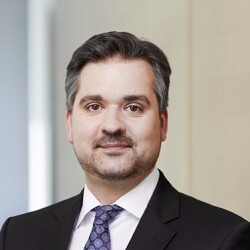This decade is a decade of decision that will lay the foundation for the lives of future generations.
To position the German economy and society for a climate-neutral age, a transformation towards a more sustainable and resilient society is essential.
In support of this need, KfW is currently rolling out an ambitious transformation agenda, “KfWplus”, which is designed to accelerate the transition and strengthen Germany as an industrial and technology location. This strategic agenda actively pushes forward the dual transformation of digitalisation and sustainability.
“We have a clear strategic focus for the years to come and will expand our promotional activities in the important fields of environmental protection and digitalisation," says Tim Armbruster, treasurer of KfW. "However, to achieve the sustainable turnaround, public spending alone will not be sufficient. Additional private capital must be mobilised to cover the enormous investments required to drive climate mitigation and digitalisation and to achieve the goal of climate neutrality by the middle of the century."
To this end, KfW has successfully implemented a variety of structures that attract private investors. For instance, it's AfricaGrow fund promotes SMEs and start-ups in reform-oriented African countries.
To achieve the sustainable turnaround, public spending alone will not be sufficient. Additional private capital must be mobilised to cover the enormous investments required to drive climate mitigation and digitalisation and to achieve the goal of climate neutrality by the middle of the century

In addition, through its subsidiary KfW Capital, the bank facilitates access to capital for innovative technology-oriented growth companies in Germany. In the future, KfW wants to scale these innovative approaches, catalysing even more private capital to support the UN's Sustainable Development Goals (SDGs).
Green bonds are another important instrument that can also contribute to these goals. Such bonds not only channel private capital into sustainable projects, they also create awareness, ensure transparency, and are an expression of responsible action on the capital markets.
To assure credibility and investor confidence in this area, transparent reporting is essential. In the context of its sustainable finance strategy, KfW is continuously improving its database and making the impact of its financing visible to its stakeholders. This applies to KfW green bonds and all core activities.
Besides the SDG-mapping of its financing, which shows that every euro invested in KfW contributes to at least one SDG, this also includes the implementation of various impact indicators and sector guidelines that are in-line with the Paris Agreement. These also help to better steer the business towards the defined focus areas.
Active and transparent impact management also facilitates the early identification of environmental, social and governance (ESG) risks, another important pillar within KfW`s sustainable finance concept.
KfW has been issuing green bonds since 2014, and this year passed the €50 billion mark in green bond issuance volume; a milestone in its funding programme.
KfW’s green bond framework - the latest edition came into effect at the beginning of 2022 - covers three categories of importance for the Paris Agreement: Renewable energy; energy efficiency; and clean transportation.
Year-to-date, KfW has issued €9 billion equivalent of its €10 billion green bond target for the year, which is about 10% of its €90 billion overall funding target for 2022.
“Since we have entered this market, we have been steadily developing our green bond framework and improving our green bond reporting”, says Petra Wehlert, head of capital markets at KfW. “We issued our first green bond when green bonds were still a niche product, of interest to just a few dedicated investors. Meanwhile investor demand has been growing enormously and today green bonds play an ever-increasing role in the transformation of the capital markets.”
While advancing the digital and green transformation in its promotional activities, KfW has also been tasked in recent months to engage in several activities under special mandates on behalf of the German government.
We issued our first green bond when green bonds were still a niche product, of interest to just a few dedicated investors...today green bonds play an ever-increasing role in the transformation of the capital markets

These transactions are intended to stabilise and secure the energy supply in Germany and to strengthen the resilience of the economy.
Support measures are taken for systemically important energy utility companies whose business base is suffering from supply reductions and significantly higher gas prices. The main purpose of these commitments comprise financing for gas and electricity margining, gas storage and replacing sources of gas procurement.
During the first nine months of 2022, these special mandates accounted for over 30% of KfW’s total new commitments. While this represents a relatively high share, they serve specific needs resulting from an unprecedented incident - the war in Ukraine.
With respect to refinancing its funding requirements resulting from these mandates, the German government-owned Economic Stabilisation Fund has been authorised by law to refinance KfW’s liquidity support to companies in the energy sector in addition to its initial purpose of providing liquidity during the pandemic.
Accordingly, the mandated transactions do not change KfW’s consistent strategic focus on sustainability targets in its business. KfW, in fact, strictly holds on to its sustainability targets and puts huge efforts in compensating for the short-term compromises that are inevitable for the moment.


